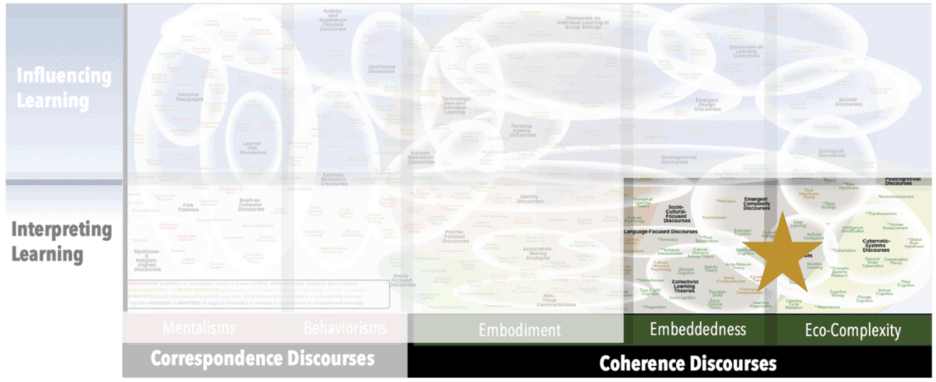AKA
Cultural Transmission
Focus
Maintenance of collective knowledgePrincipal Metaphors
- Knowledge is … culture-defining repertoire of behavior, interpretation and information
- Knowing is … utilizing (cultural knowledge)
- Learner is … individual and culture, simultaneously
- Learning is … mimicking, acquiring, developing
- Teaching is … transmitting, modeling
Originated
2000sSynopsis
Cultural Learning is an area of study focused on the ways that people or non-human animals develop and perpetuate their collective knowledge – including, as appropriate to the group, patterns of behavior, habits of interpretation, and accumulated information. Three stage-like levels of learning are proposed:- Imitative Learning (Michael Tomasello, 2000s) – the first stage of Cultural Learning, during which the individual learns to mimic relevant aspects of collective knowledge
- Instructed Learning (Michael Tomasello, 2000s) – the second stage of Cultural Learning, during which a more-accomplished member deliberately instructs a less-accomplished member
- Collaborative Learning (Michael Tomasello, 2000s) – the third stage of Cultural Learning, during which multiple individuals work together on a common problem. (Note: This meaning is distinct from the much more prominent discourse on group learning called Collaborative Learning.)
- Chain Reproduction – the process by which an idea or narrative is gradually transformed as it is communicated from one person, group, or generation to another
- Cliodynamics (Peter Turchin, 2000s) – named after the Roman muse of history, Clio, the study and mathematical modeling of the long-term dynamical processes involved in the rise and fall of cultures, birth and death of religions, creation and migration of knowledge, and so on
- Cultural Accommodation Theory (Howard Giles, 1970s) – a theory of communication that concerns both one’s efforts to attune to one’s communicative partner and one’s perceptions of the partner’s efforts to reciprocate
- Cultural Epoch Theory – the largely discredited perspective that all human cultures progress through the same sequence of increasingly complex stages. Asserted sequences typically include such epochs as hunting-gathering, farming, and industrial
- Cultural Evolution (David George Ritchie, Thorstein Veblen, late 1800s) – an application of Universal Darwinism to cultural change that is focused on the maintenance and transformation of information that defines the culture. Associated discourses include:
- Intelligence Principle (Frank Tipler, 1980s) – the suggestion that the improvement and maintenance of intelligence is the driving force of Cultural Evolution
- Developmental Systems Approach (Developmental Contextual Model) – the notion that development involves the mutually specifying (i.e., affecting and being affected by) influences of biology and experience, spanning levels from the genetic to the cultural
- Dual Inheritance Theory (Richard Dawkins, E.O. Wilson, 1960s) – an effort to explain human activity in terms of two intertwined processes: biological evolution and cultural evolution. Concisely, changes at the genetic level can influence culture, and changes in culture can influence genetic selection.
- Inventionism – the conviction that the practices and beliefs of a culture were entirely developed by/within that culture (vs. imported from, based on, or otherwise influenced by other cultures)
- Primary Knowledge / Secondary Knowledge (Biologically Primary Knowledge / Biologically Secondary Knowledge; Primary Learning / Secondary Learning) (David Geary, 1990s) – rooted in Evolutionary Psychology (see Universal Darwinism), a distinction between those abilities and habits of thinking that the human brain has been primed to learn by evolution (i.e., biologically primary; hence Primary Knowledge) and culture-specific skills that humans are not biologically primed to learn, but that are still needed to live successfully in today’s world (Secondary Knowledge). Primary Knowledge is seen as the foundation of Secondary Knowledge, and so the constructs are argued to be relevant to curriculum design.
Commentary
Cultural Learning comes out of psychology, and it many ways reflects the movement of that domain from a myopic focus on the individual psyche toward the realization that cultures unfold from and are enfolded in psyches. That said, aspects of the discourse suggest that it is still beholden to many limited assumptions of its parent discipline. Consequently, while Cultural Learning is generally perceived as innovative and provocative within psychology, it is seen as somewhat less so in many other domains. Authors anSubdiscourses:
- Chain Reproduction
- Cliodynamics
- Collaborative Learning
- Cultural Accommodation Theory
- Cultural Epoch Theory
- Cultural Evolution
- Developmental Systems Approach (Developmental Contextual Model)
- Dual Inheritance Theory
- Imitative Learning
- Instructed Learning
- Intelligence Principle
- Inventionism
- Primary Knowledge / Secondary Knowledge (Biologically Primary Knowledge / Biologically Secondary Knowledge; Primary Learning / Secondary Learning)
Map Location

Please cite this article as:
Davis, B., & Francis, K. (2024). “Cultural Learning” in Discourses on Learning in Education. https://learningdiscourses.com.
⇦ Back to Map
⇦ Back to List
